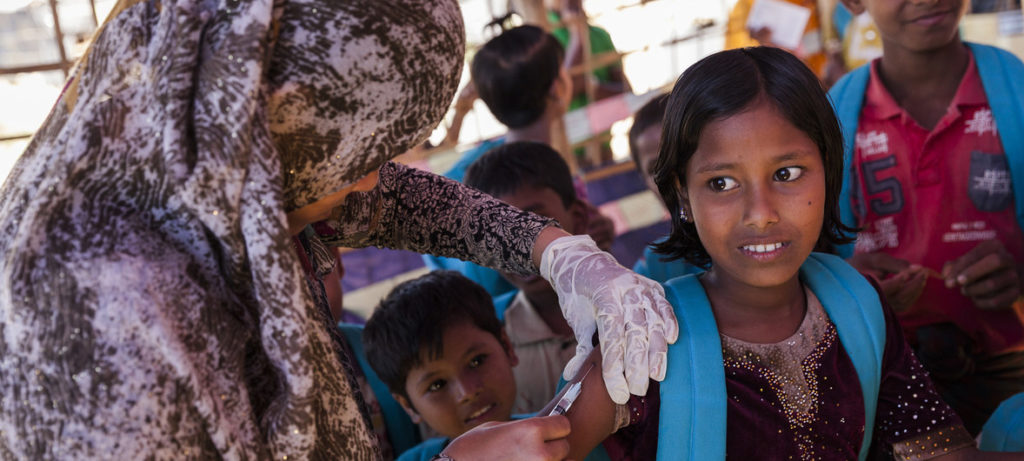UN Appeals for Support to Tackle ‘Massive’ Health Needs of Rohingya Refugees in Bangladesh
UNITED NATIONS, 2 Apr 2018
UN News – TRANSCEND Media Service
With relief agencies in Bangladesh struggling to assist more than a million vulnerable Rohingya refugees crowded into makeshift camps along the country’s south-east coast, the World Health Organization (WHO) today appealed for international support to help the cash strapped health sector scale up its response.
29 Mar 2018 – “This is one of the biggest humanitarian crises in recent times,” Dr. Poonam Khetrapal Singh, the WHO South-East Asia Regional Director told a partners’ meeting in Dhaka, Bangladesh’s capital.
“No single agency or the Government of Bangladesh alone can meet the massive health needs of such a large population group,” she said.
The Rohingya population has settled in an area prone to cyclones, and on terrain that will flood as soon as rains begin. “The risk of outbreak of life threatening water and vector borne diseases under such conditions is huge,” she explained.
Since August 2017, nearly 700,000 minority Muslim Rohingyas have fled violence in Myanmar across the border into Bangaldesh’s Cox’s Bazar, joining several hundred thousand more that were already settled there in overcrowded camps.

A health worker inoculates a Rohingya girl in the Unchiprang makeshift refugee camp in Bangladesh’s Cox’s Bazar district during a UNICEF-supported measles vaccination campaign.
UNICEF/Brown
Coordinating the work of over 100 partners on the ground, along with the Ministry of Health, WHO has facilitated a contingency plan for the rainy season.
To minimize the risk of diseases and deaths, the plan aims to continue health services during rains and floods. Additionally, all 207 health facilities in the area have been assessed for vulnerability during rains, with 25 per cent of them slated for relocation.
Since the start of the Rohingya crisis, 900,000 doses of cholera vaccine were administered to the refugees and their host communities, in addition to two vaccination campaigns for measles and three for diphtheria, which concluded earlier this week with WHO support.
“However,” Dr. Khetrapal Singh warned “much of the health sector’s capacity to respond depends on availability of resources.”
Moreover, the vulnerable population will need continued services for reproductive, maternal and child health, communicable and non-communicable diseases, as well as psychosocial support, the WHO Regional Director added.
WHO has appealed to partners for $16.5 million for continued support in 2018, which is part of the $113.1 million being sought by all health partners under the Joint Response Plan for the Rohingya crisis.
DISCLAIMER: The statements, views and opinions expressed in pieces republished here are solely those of the authors and do not necessarily represent those of TMS. In accordance with title 17 U.S.C. section 107, this material is distributed without profit to those who have expressed a prior interest in receiving the included information for research and educational purposes. TMS has no affiliation whatsoever with the originator of this article nor is TMS endorsed or sponsored by the originator. “GO TO ORIGINAL” links are provided as a convenience to our readers and allow for verification of authenticity. However, as originating pages are often updated by their originating host sites, the versions posted may not match the versions our readers view when clicking the “GO TO ORIGINAL” links. This site contains copyrighted material the use of which has not always been specifically authorized by the copyright owner. We are making such material available in our efforts to advance understanding of environmental, political, human rights, economic, democracy, scientific, and social justice issues, etc. We believe this constitutes a ‘fair use’ of any such copyrighted material as provided for in section 107 of the US Copyright Law. In accordance with Title 17 U.S.C. Section 107, the material on this site is distributed without profit to those who have expressed a prior interest in receiving the included information for research and educational purposes. For more information go to: http://www.law.cornell.edu/uscode/17/107.shtml. If you wish to use copyrighted material from this site for purposes of your own that go beyond ‘fair use’, you must obtain permission from the copyright owner.